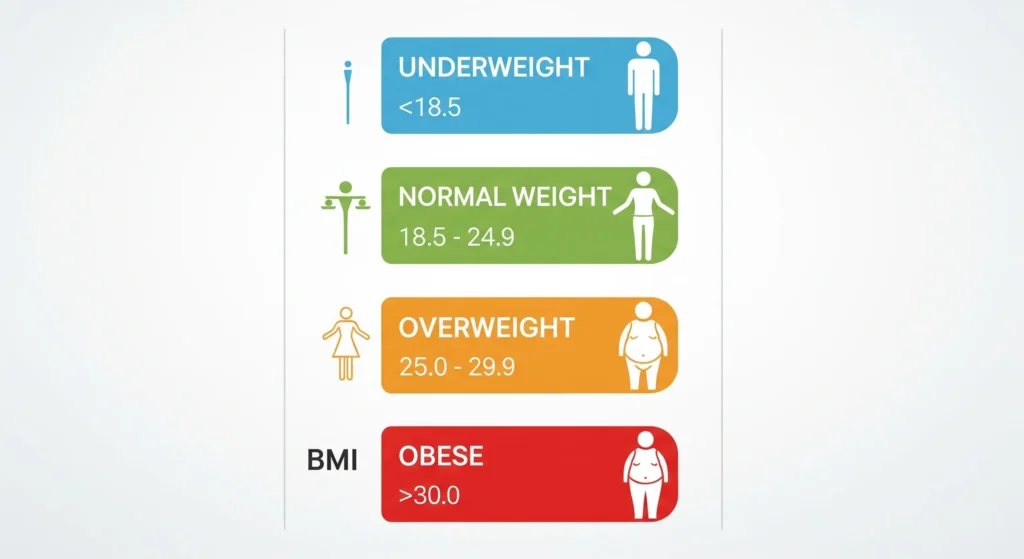Overweight Life Insurance: 7 Steps to Find the Right Policy

Look, I get it. You’ve been putting off getting life insurance because you think your extra pounds automatically disqualify you, right? Well, I’ve got some good news that’ll make your day – that’s total BS!
Here’s the real deal: Overweight life insurance isn’t some mythical unicorn that doesn’t exist. It’s doable, and honestly, it’s probably way more affordable than you think. Yeah, even if your BMI makes you cringe a little when you step on that doctor’s scale.
I know what you’re thinking – “But insurance companies hate fat people!” Nope, not true. These companies have figured out that excluding everyone who’s not a size 2 would mean losing a huge chunk of customers (and money). They’re way more chill about weight than they used to be.
This guide is gonna break down everything you need to know about getting life insurance when you’re carrying some extra weight. No judgment here – just straight talk about how to protect your family without breaking the bank or jumping through crazy hoops.
What We’re Covering Today
- Can you get life insurance if you’re overweight? (Spoiler: YES!)
- What’s this BMI thing, and why do insurance companies care?
- How much extra will you pay because of your weight?
- Smart tricks to get better rates
- Your insurance options (there are more than you think!)
- What to do if someone says “no thanks”
- Other types of insurance you might want
- Your next steps
- All your burning questions answered
Can You Get Overweight Life Insurance? Absolutely!
Okay, let’s start with the big question everyone’s wondering about. Can you get overweight life insurance? The answer is a big, fat YES (pun intended).
I’m not gonna sugarcoat it – being heavier can affect your rates. But here’s what most people don’t know: insurance companies aren’t nearly as picky as you think. They’ve realized that weight alone doesn’t tell the whole story about someone’s health.
If you’re reasonably healthy otherwise, don’t smoke, and aren’t dealing with a bunch of other health issues, you’ve got a good shot at getting decent coverage. I’ve seen plenty of people who thought they were “uninsurable” walk away with great policies.
The only time you might run into real trouble is if you’re dealing with extreme obesity plus a whole bunch of other health problems, like:
- Sky-high blood pressure
- Diabetes that’s all over the place
- Sleep apnea that makes you sound like a freight train
- Heart problems
- A cocktail of weight-related health issues
Even then, don’t give up! Some companies specialize in exactly these situations. They’re like the “we’ll insure anyone” stores of the insurance world.
The bottom line? The insurance world has gotten way more inclusive. They want your business, and they’ve figured out how to make it work for pretty much everyone.
What’s BMI, and Why Do Insurance Companies Obsess Over It?

Alright, let’s talk about BMI – that annoying little number that somehow defines how “healthy” you are according to insurance companies.
The BMI Breakdown
BMI stands for Body Mass Index, and it’s basically just your weight divided by your height squared. The math is simple: BMI = kg/m² or if you’re American like me, (weight in pounds ÷ (height in inches)²) × 703.
It’s like a really basic way to figure out if you’re in the “normal” weight range. Here’s how they break it down:
Underweight: BMI under 18.5
- Insurance companies worry about this too – they think you might be sick
Normal Weight: BMI 18.5 to 24.9
- This is the “golden zone” where you get the best rates
Overweight: BMI 25 to 29.9
- You might pay a bit more, but it’s not the end of the world
Obese: BMI 30 and up
- Class I: 30.0 – 34.9 (not too bad)
- Class II: 35.0 – 39.9 (getting pricier)
- Class III: 40.0+ (definitely gonna cost more)
Why Insurance Companies Love BMI (Even Though It’s Kinda Dumb)
Insurance companies use BMI because it’s quick, easy, and gives them a ballpark idea of your health risks. Higher BMI often means higher chances of stuff like:
- High blood pressure
- Type 2 diabetes
- Heart disease
- Sleep apnea
- Joint problems
But here’s where it gets stupid – BMI doesn’t account for whether you’re built like The Rock or just love pizza a little too much. A bodybuilder and a couch potato can have the same BMI, but obviously, they’re not the same health risk.
The Problem with BMI

Look, BMI is basically like judging a book by its cover. It doesn’t consider:
- Whether you’re muscular or just squishy
- Your age (older folks naturally weigh more)
- If you’re male or female (different body compositions)
- Your ethnic background
- Where do you carry your weight
Some “overweight” people are healthier than skinny people – crazy, right? Smart insurance companies are starting to figure this out and look at the bigger picture.
How Your Weight Affects Your Life Insurance Rates
Okay, let’s get real about money. Your weight impacts what you’ll pay for overweight life insurance, but it’s not as scary as you might think.
How Insurance Companies Rate You
Think of it like getting graded in school, except the grades determine how much you pay:
A+ Student (Preferred Plus):
- You’re in perfect health-wise
- Probably not happening if you’re overweight unless you’re just barely over the line and super fit otherwise
B Student (Preferred):
- Pretty good health with maybe one small issue
- possible if you’re only a little overweight and everything else looks good
C Student (Standard):
- Average health, maybe a couple of manageable problems
- This is where most overweight folks end up, and honestly, the rates aren’t bad
D Student (Substandard):
- Some serious health stuff is going on
- Usually not just because of weight unless you’re dealing with extreme obesity plus other issues
What You’ll Pay
Here’s the part everyone wants to know – how much extra will this cost you?
If you’re just overweight (BMI 25-29.9), you might not pay much extra at all. Maybe 0-50% more than someone with a “perfect” BMI, but that’s still totally reasonable.
If you’re in the obese category (BMI 30+), yeah, you’ll probably pay more. We’re talking anywhere from 25% to 300% more, depending on how high your BMI is and what other health stuff you’ve got going on.
Here’s a real example: A 5’10” guy weighing:
- 266-341 lbs might pay 25-50% more
- 342-356 lbs might pay 100-150% more
- 357+ lbs might pay 200%+ more
Sounds scary? Remember, even paying double for life insurance is usually way cheaper than you think. We’re often talking about the difference between $30 and $60 a month – not exactly breaking the bank.
Good News About Getting Older
Here’s something cool – insurance companies get more chill about weight as you get older. They know that putting on some pounds is just part of life after 40. A 65-year-old carrying some extra weight isn’t nearly as concerning to them as a 25-year-old with the same BMI.
What Makes Things Worse (and Better)
Things that make your rates go up even more:
- Smoking (this is the big one – smokers pay 2-5 times more!)
- High blood pressure, diabetes, or other weight-related health issues
- Taking weight-loss medications might complicate things
Things that help:
- Not smoking (seriously, this is huge)
- Regular doctor checkups showing you’re managing your health
- Good blood work despite higher weight
- Being active and fit even if you’re heavier
Smart Ways to Get Better Overweight Life Insurance Rates

Alright, let’s talk strategy. Getting overweight life insurance at decent rates isn’t just about crossing your fingers and hoping for the best. There are some legit tricks to improve your chances and lower your costs.
The Weight Loss Game Plan
Look, I’m not gonna preach about losing weight – that’s between you and your doctor. But if you are planning to drop some pounds, here’s how it affects your insurance:
The 12-Month Rule: Insurance companies want to see that you can keep weight off for at least a year before they’ll give you credit for it. They’ve seen too many people lose 30 pounds and then gain back 40.
The Reconsideration Option: Here’s something cool – if you lose weight after getting your policy, you can ask them to reconsider your rates. They’ll make you do another medical exam, but if you’ve kept the weight off and improved your health, they might lower your premiums. And here’s the best part – they can’t raise your rates if they find something else during the process.
Don’t Wait to Apply: This is important – don’t put off getting insurance while you’re trying to lose weight. Get coverage now (even if it costs more) and then apply for better rates later. Your family needs protection today, not after you hit your goal weight.
Quit Smoking (Seriously, This is Huge)
If you smoke, vape, chew tobacco, or use nicotine gum – stop. Like yesterday. After 12 months of being nicotine-free, your rates can drop by 50-80%. Combined with being overweight, smoking is like a double whammy for your premiums.
Shop Around Like Your Life Depends on It
This is where most people mess up. They apply to one company, get quoted crazy high rates (or get rejected), and give up. Don’t do this!
Different insurance companies have totally different attitudes about overweight life insurance. Company A might want to charge you double while Company B offers you their standard rates. It’s wild how much variation there is.
Work with a Broker: Seriously, get an independent insurance broker who knows which companies are cool with higher BMIs. They’re like matchmakers for insurance – they know which companies will love you and which ones will swipe left.
A good broker can also help if you’re muscular or “big-boned” by pushing for additional measurements like chest-to-waist ratio instead of just BMI.
Be Honest
I know it’s tempting to fudge the numbers a little, but don’t. Insurance companies will figure it out during the medical exam, and lying on your application can void your entire policy. Your family could end up with nothing when they need it most.
Plus, being upfront often works in your favor. Insurance underwriters are people, too, and they appreciate honesty. Give them the full picture of your health, including the good stuff.
Your Overweight Life Insurance Options (You’ve Got More Than You Think!)
The cool thing about overweight life insurance is that you’ve got tons of options. Let’s break down what’s available:
Term Life Insurance (Your Best Friend)
This is probably where you want to start. Term life insurance is:
- Cheap: We’re talking like $20-50 a month for decent coverage
- Simple: Covers you for a set period (10, 20, or 30 years)
- Flexible: You can convert it to permanent insurance later without another medical exam
Even with a higher BMI, term life insurance is usually totally doable. The rates might be higher than someone with a “perfect” BMI, but it’s still way more affordable than most people expect.
Whole Life Insurance (The Fancy Option)
This is the more expensive, bells-and-whistles version that lasts your whole life and builds cash value. It’s like buying instead of renting.
Pros:
- Coverage for life (no worrying about outliving your policy)
- Builds cash value you can borrow against
- Premiums stay the same forever
Cons:
- Way more expensive
- More complex
- Harder to qualify for if you’re overweight
Honestly, most people are better off with term life insurance, especially if budget is a concern.
No Medical Exam Insurance (For the Exam-Phobic)
Hate the idea of some stranger poking and prodding you? No medical exam insurance might be your thing.
Simplified Issue:
- Answer some health questions, but skip the medical exam
- Faster approval (days instead of weeks)
- Can get up to $1 million in coverage with some companies
- Costs more because they’re taking a bigger risk
Guaranteed Issue:
- They have to accept you no matter what
- No health questions, no medical exam, nothing
- Usually limited to smaller amounts ($25,000-$50,000)
- Always has a waiting period for natural death (usually 2 years)
- More expensive per dollar of coverage
Group Insurance Through Work (The Easy Button)
If your job offers group life insurance, grab it! It’s usually:
- Super cheap or even free
- No medical questions or exams
- Immediate coverage
The downside? It’s usually not enough coverage, and you lose it if you leave your job. But hey, it’s a start!
What If Someone Says No? Don’t Panic!
Getting rejected for overweight life insurance isn’t the end of the world. Seriously, don’t let one “no” stop you.
Why Companies Say No (It’s Not Always About Weight)
Sometimes what looks like weight discrimination is actually about other stuff:
- Recent dramatic weight loss (they worry about underlying health issues)
- Weight plus other health problems
- Extreme BMI numbers (like 50+)
- Not being honest on your application
Your Backup Plans
Try a Different Company: Each insurance company has different rules. Getting rejected by State Farm doesn’t mean Prudential won’t love you.
Specialist Companies: There are insurance companies that specialize in “difficult” cases. They’re more expensive, but they’ll work with almost anyone.
Group Coverage: Remember that work insurance? Even if you can’t get individual coverage, group insurance through your employer is usually guaranteed.
Wait and Try Again: If you got rejected because of recent health changes, improving your health and trying again in 6-12 months often works.
Other Insurance You Might Want
While we’re talking about overweight life insurance, let’s chat about some other coverage that might make sense:
Critical Illness Insurance
This pays you a lump sum if you get diagnosed with something serious like cancer, heart attack, or stroke. Since being overweight can increase these risks, it might be worth considering.
The cool thing? It’s often available even with a BMI up to 45, and the rates aren’t too crazy until you hit BMI 33+.
Disability Insurance
This replaces your income if you can’t work because of illness or injury. Super important if you’re the breadwinner.
Good news – it’s usually available for people with higher BMIs, often up to BMI 36 at standard rates.
Health Insurance Add-Ons
Don’t forget about health and dental insurance to cover stuff your provincial health care doesn’t. This becomes extra important if you’re dealing with weight-related health costs.
Alright, Here’s What You Need to Do
Getting overweight life insurance doesn’t have to be complicated or stressful. Here’s your game plan:
Right Now Today
- Get some quotes online – Just to see what ballpark you’re looking at
- Find an independent insurance broker – Someone who works with multiple companies and knows the overweight-friendly ones
- Gather your medical records – Make a list of medications, doctor visits, and health history
Don’t Wait Around
Look, life insurance gets more expensive every year you wait. Don’t spend months trying to lose weight first – get coverage now and improve it later if you want.
Keep It Real
Be honest about your weight, health, and lifestyle. It’s gonna come out during the medical exam anyway, and honesty usually gets you better treatment from underwriters.
Think Long-Term
Consider what coverage you need. Don’t just grab the cheapest option – make sure it’s enough to protect your family.
Your Burning Questions About Overweight Life Insurance
How exactly do they calculate my BMI?
They use the standard formula: your weight in pounds divided by your height in inches squared, then multiplied by 703. So if you’re 5’10” and weigh 200 pounds, that’s 200 ÷ (70 × 70) × 703 = 28.7 BMI.
Should I lose weight before applying?
Nah, don’t wait. Get coverage now while you’re healthy enough to qualify, then you can always ask for reconsideration if you lose weight later. Plus, rates go up with age, so waiting might cost you more.
Why do they care about my weight loss history?
They want to know if recent weight loss is sustainable or if you might gain it back. If you’ve lost a bunch of weight recently, they might average your old and new weight for pricing. They’ve learned that dramatic weight loss sometimes means underlying health problems.
Can they use measurements other than just weight?
Some companies will consider waist measurements or chest-to-waist ratios, especially if you’re muscular. A good broker can push for this if it would help your case.
What if I’m overweight AND have mental health issues?
You can still get overweight life insurance, but both factors will affect your application. Be honest about everything, and consider working with a broker who specializes in complex health cases.
What’s the highest BMI they’ll accept?
It depends on the company. Regular insurers usually cap out around BMI 45-50, but specialist companies will go higher. Guaranteed issue policies don’t care about BMI at all, but they have other limitations.
Can I apply for better rates later?
Absolutely! Most companies let you apply for reconsideration annually if your health improves. The cool part is your current rates are locked, so there’s no risk of them going up even if they find new issues.
Look, getting life insurance when you’re overweight isn’t as scary as you think. Yeah, you might pay a little more, but protecting your family is worth it. Don’t let anyone make you feel bad about your weight – focus on getting the coverage you need and moving forward. You’ve got this!




